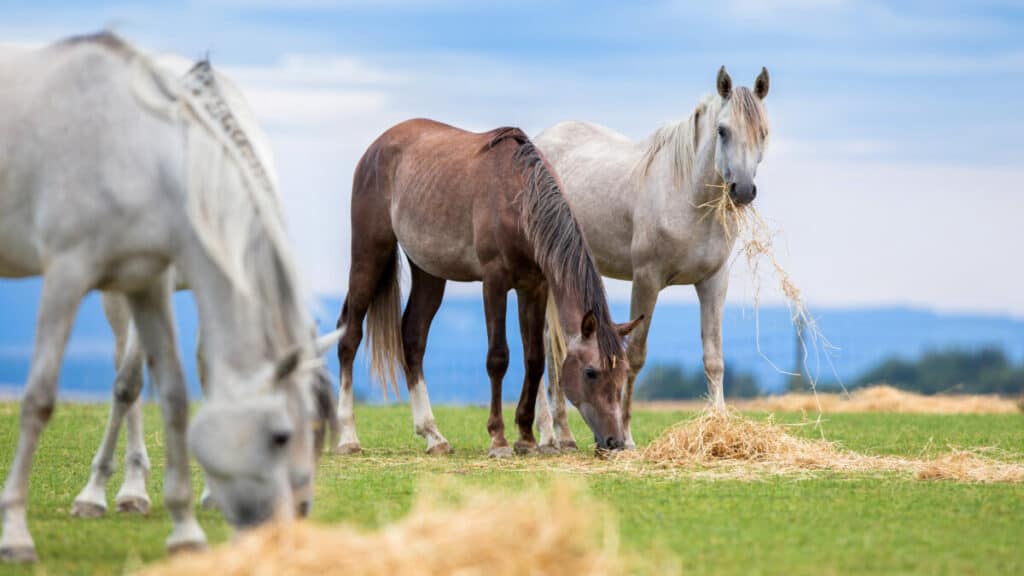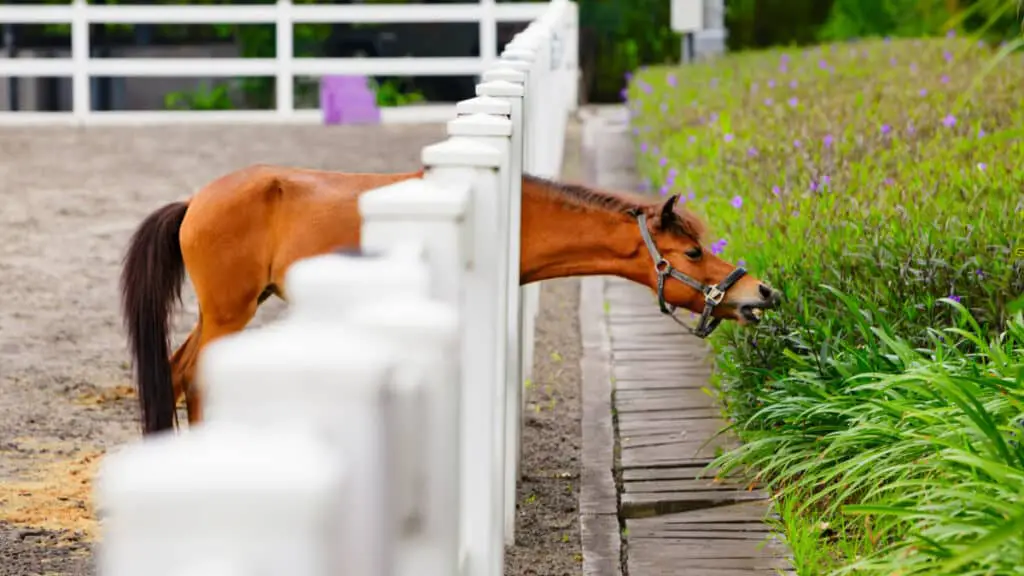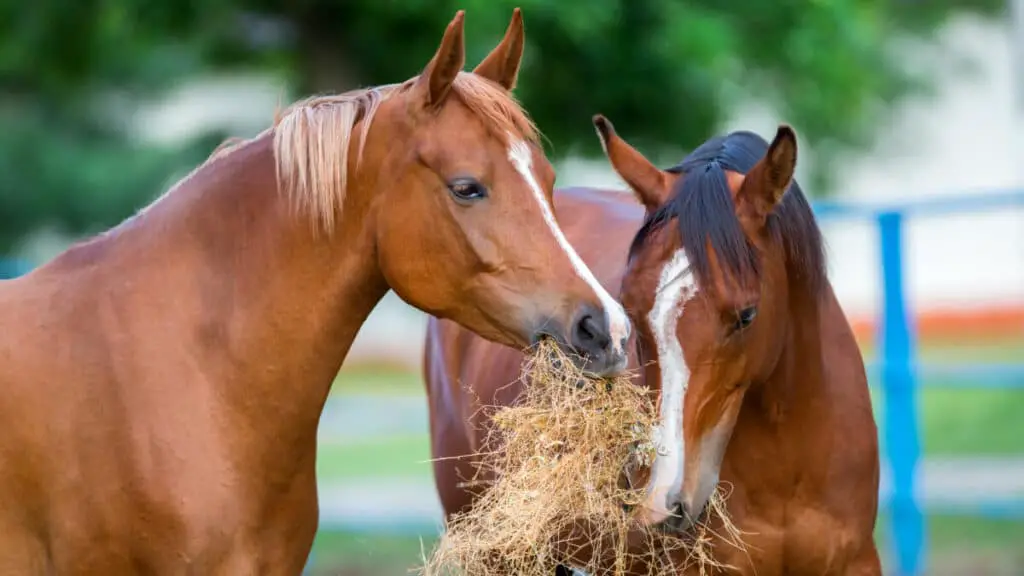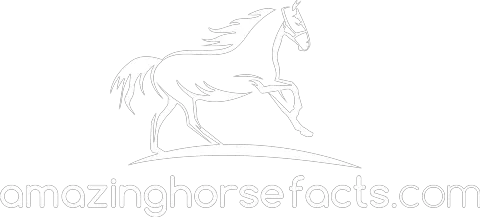Skip To Section
Horses have evolved to be grazers, eating little and often rather than consuming bigger meals at one time. The natural diet of horses and ponies is largely grass which has a very high fiber content.
Horses need this high kind of high-roughage diet that models their natural feeding pattern in the wild. Grass, hay, haylage, or a hay replacement are all suitable core horse foods.
If you’re wanting to learn more about what horses eat and what kind of diet will benefit your horse’s health, then this could be the guide for you.
This article will tell you more about the nutrients horses need, the foods they enjoy most, and the ones which might be harmful to them…
What Food Do Horses Eat?

Wild horses are herbivores and grazing animals, eating a variety of different grasses and other non-toxic meadow plants. In a modern domesticated environment, following a diet as close as possible to this natural diet can help to prevent the occurrence of stomach ulcers, colic, laminitis, and other common horse health issues.
The horse gastrointestinal tract runs from the mouth, down the esophagus to the stomach, and then through the small intestine and a highly developed large intestine (caecum, large colon, small colon) before reaching the rectum.
Unlike cattle, horses have a single small stomach. They are “hindgut fermenters,” which means that they rely on bacteria living in the caecum and large intestine to ferment and digest fiber.
Horse stomachs hold a surprisingly small amount (only 2-4 gallons) and empty quickly, with food passing through their bodies at a rate of about 1 foot per minute. To keep up with this speedy rate of digestion, horses might spend up to 17 hours grazing each day.
1. Grasses
Horses require a core diet made up of good pasture grass, hay, or haylage sourced from a variety of grasses, with plenty of clean water. Their strong foraging instinct should be supported both in order for them to access a range of nutrients by themselves without the need for supplements and to prevent them from becoming bored and frustrated.
Hay is normally a form of grass that has been cut and dried as a preserved store of animal feed. It can also be derived from the dried stems of legumes for higher-protein hay. Grass hay is higher in fiber which is often a better choice for horses.
Haylage is an alternative to grass or hay. It is produced when cut grass is left to dry for less time than for hay. It is wrapped up immediately after being baled and a process of natural fermentation turns the grass to haylage, retaining around 30-40% of its moisture and 90% of grass’s feed value.
2. Fruit And Vegetables
Horses are capable of digesting quite a wide range of foods including grains, vegetables, and fruits but this doesn’t mean that they should eat large quantities of anything except grass-based foods.
Fruits and vegetables are ideal occasional horse treats, which can be used to reinforce training and build a strong bond with their owners. Horses enjoy many fruits and vegetables with apples, pears, and carrots being common favorites.
As with any treat, fruit and vegetables should only be given in moderation (e.g. one piece per day) and should not form a large part of the horse’s diet. Overconsumption could lead to colic or laminitis.
3. Concentrates / Straights / Cereals
These terms all refer to grains such as oats, barley, and corn, which contain more energy and fat than grass or grass hays. An average horse will not need to be fed these foods as part of its normal diet and regular consumption could cause them to become overweight.
At the same time, the exact dietary needs of individual horses can vary.
Horses who work harder (e.g. on a farm, in a busy riding school, or in competitive sport) may need food with a higher calorific density than horses who do not work. Regular servings of oats may be a healthy part of their diet.
Breeding horses may require higher energy foods or specific nutrients to prepare for or support a pregnancy.
Older horses may also benefit from more concentrated foods if they are not drawing all the energy they need from a normal grass-based diet.
4. Nutritional Supplements
If you are unsure whether your horse is getting all the vitamins, minerals, and other nutrients they require, you can provide a supplement or special feed.
Consult a vet or equine nutrition expert before changing your horse’s diet.
If a horse has a particular health condition (e.g. HYPP, or insulin resistance) you should take the advice of veterinary experts in tailoring their diet to their medical needs.
What Are Horses Not Allowed To Eat?

Some foods are unhealthy for all horses, while others can be actively harmful to individual horses with specific medical conditions or disorders. If you’re new to keeping a horse, make sure you learn all about their health and dietary requirements from credible professional or expert sources.
1. Large And/Or Infrequent Meals
The horse’s digestive tract has evolved to deal with frequent small meals and functions at its best when it has a constant small load of high-fiber food passing through it. Horses have the smallest stomach relative to body weight of any domestic animal and their digestion works very fast, with food passing through their gut at a rate of around 1 foot each minute!
Overfeeding or underfeeding should both be avoided. If parts of a horse’s gut become empty, this can lead to your animal feeling hungry, distressed, and potentially developing colic or other digestive problems.
2. Choke Risk Items
Whole fruit or vegetables, cores, or large pits or stones may all cause a horse to choke. Fruit cores are often more fibrous and tough than the rest of a fruit, presenting a greater choking hazard. It is safest to prepare fruit and vegetables by removing the core, stem, and seeds and then chopping them into manageable pieces before serving to your horse.
In horses “choke” refers to an item blocking the oesophagus, rather than the trachea as in humans. Choke can often resolve alone but you should seek medical advice quickly if needed. A choking horse may appear anxious, show a frothing green nostril discharge, or hold its head outstretched and be coughing.
Aspiration pneumonia is a serious complication of choking in horses. It is caused by food or saliva backing up in the oesophagus and being accidentally inhaled. This can cause infection, leading to severe pneumonia. The fatality rate of aspiration pneumonia can be up to 25%.
3. Processed Foods
Processed foods are often low in fiber, nutrients, and water, and high in sugar, salt, and fat. This is the complete opposite of a horse’s natural grass-based diet which contains large quantities of low-fat roughage, a high water content, and little sugar, salt, or fat. A highly processed diet could therefore cause your horse serious digestive discomforts and pain.
To avoid stomach upsets, vitamin and mineral deficiencies, or even colic, do not make processed foods a major part of your horse’s diet.
4. Meat
As obligate herbivores, the teeth and digestive systems of horses have not evolved to handle a meat-based diet. Accidentally feeding your horse a small amount of meat once will probably not harm them but it should not be a regular habit.
5. Dairy Foods
Horses cannot digest lactose which is present in all dairy products made from cow milk. Feeding your horse dairy will probably result in digestive disruption, discomfort, and diarrhea.
6. Sugary Food For Horses With Insulin Disorders
Sugary and sweetened foods are not healthy treat options for any horse. However, in horses with insulin resistance, these foods could do greater harm and even sweet fruits (e.g. very ripe pears) should be avoided.
7. Potassium-Rich Foods For Horses With HYPP
Horses who suffer from the condition hyperkalemic periodic paralysis (HYPP) require a low-potassium diet. They should not be given high potassium foods such as pears.
What Is A Horse’s Favorite Food?

Horses love to eat sweet foods and sugar-lumps were often fed to horses in the era of our grandparents and great-grandparents. Whether a ripe apple or strawberry, a carrot, or a lump of sugar, your horse will probably love eating it, but that doesn’t mean that it’s good for them…
While fruit and vegetables also contain fiber, vitamins, and minerals, straight sugar or processed confectionary has little or no nutritional value to offer your horse. Although a single sugar cube will probably not cause harm, fruit and vegetables in moderation are a healthier treat choice overall.
Like humans, if given the opportunity horses may eat more sweet treats than are good for them, resulting in colic and other digestive upsets. Do not provide large portions of treat foods and keep horses away from orchards where sweet fruits may be freely available.
Which Are The Healthiest Foods For A Horse’s Diet?
Some form of grass should always be a horse’s main source of energy, nutrients, and fiber. This will often be pasture in the summer months and various types of horse hay or haylage in the winter months.
For optimum health, horses should have continuous access to clean, fresh water and the opportunity to graze as much as possible on different grasses and non-toxic plants. When clean water and wide grazing are limited, horses can develop digestive disorders or ulcers and sores in their stomachs.
A healthy horse should not need any other foods in its diet beyond these basics, but it might still enjoy occasional fruit and vegetable treats without experiencing harm.
A working horse might require a higher calorie diet than an average horse. In this case, you may choose to add oats, barley, or corn to their feed.
A horse with medical conditions should be fed a diet compatible with its individual requirements, adjusting sugar, mineral content, and other nutrients according to expert advice.
What Food Can Harm Or Even Kill Horses?
Unlike humans, the physiology of horses means that they cannot normally vomit up a toxic or irritating substance. This lack of vomiting makes them more likely to suffer poisoning as they have no natural means to remove toxins from their digestive system before they can cause internal damage.
If you are a horse owner, you should therefore make yourself aware of the range of plants and food substances which can harm horses.
1. Ragworts
Common ragwort (Jacobaea vulgaris) and other ragwort family plants are sources of pyrrolizidine alkaloids. These are metabolized into toxic compounds in a horse’s liver and small intestines, potentially causing liver failure or death. While these metabolites are not cumulative, consuming even a small amount of ragwort kills liver cells. Chronic poisoning can still take place over time as liver function gradually erodes.
For acute ragwort poisoning to occur, a horse would have to eat approximately 1-10% of its body weight in ragwort. In a 500 kg horse, this equates to eating roughly 250-2500 plants. Chronic ragwort poisoning is more common than acute poisoning.
The symptoms of ragwort poisoning are broad and can include loss of weight, appetite, and energy, as well as a dulled coat, sensitivity to light, jaundice, and neurological issues.
Horse owners should regularly check their animals’ pasture land for ragwort and remove it if found, by digging up at the roots and burning it.
2. Nightshade Family, Including Horse Nettle
The family of nightshade plants includes a number of members who are toxic to horses. These range from horse nettle, black nightshade, and deadly nightshade, through several species of ground-cherry, to ordinary human foods like potato, tomato, eggplant/aubergine, and peppers.
All of these plants contain glycoalkaloid solanine, which can negatively affect the central nervous system and digestion in horses. An animal may need to consume 1-10 lb of a plant to be at risk of death, with solanine poisoning characterized by symptoms including dilation of pupils, poor muscle control and convulsions, loss of appetite, and diarrhea.
Don’t feed potato peelings to horses – solanine is particularly concentrated in the skin of raw potatoes.
3. Chocolate
Chocolate contains a chemical called theobromine which is toxic to horses (as well as dogs and several other domestic animals). When ingested by horses, theobromine can cause severe colic, metabolic disorders, and seizures, as well as internal bleeding.
4. Yew Trees
Yew leaves, bark, and branches are all highly poisonous to horses with even a tiny dose potentially fatal. Yew contains the fast-acting toxic alkaloids taxine A and B and is the most common cause of equine poisoning in several European countries.
While the bitter taste of the plant is likely to be off-putting to animals, taxine acts so fast that horses have been known to die with yew leaves still in their mouths. Yew poisoning cannot be treated and affected horses will die quickly from cardiac arrest.
Never graze horses in areas where they may have access to yew.
5. Sycamore Seeds And Seedlings
Atypical myopathy, also known as sycamore myopathy or as seasonal pasture poisoning, is a fairly recently recognized and often lethal horse disease, with a fatality rate of around 70%.
Observed mainly in autumn and spring, research has established that atypical myopathy is caused by consuming a substance called hypoglycin A toxin, which occurs in the seeds, seedlings, and blossom of sycamore and certain other trees in the Acer genus.
This toxin inhibits the production of energy in muscle cells, weakening the heart and other muscles. Symptoms include stiffness, tremors, collapse, and low temperatures. Urine can appear dark due to the release of the pigment myoglobin which can cause kidney damage.
6. Cyanide Sources (Including Apple, Pear And Other Fruit Seeds And Leaves)
Cyanide poisoning in horses and other animals is normally caused by eating plants that contain cyanogenic glycosides, precursor compounds that are metabolized into hydrogen cyanide in the digestive system. Sources of cyanide include the seeds of apples, pears, cherries, and other plants.
Most fruit seeds only contain small amounts of these glucosides and it would take a large number of, e.g. pear seeds, to significantly harm a horse. However, some varieties of a particular fruit can contain more cyanogenic glucosides than others (e.g. Bradford pears).
For maximum safety, prepare fruit for horses by removing the core and seeds, and then chopping them into small pieces. Do note that the leaves of these plants may also contain significant levels of cyanogenic glycosides, especially when wilting or dying.
7. Oak Trees (Including Acorns)
Tannic and gallic acids present in oak trees and acorns can create havoc in a horse’s digestive system and kidneys. Consumption of these plants may cause symptoms including weight loss, constipation, colic, edema, and bloody urine.
Seek veterinary advice but acorn poisoning can often be treated with activated charcoal.
8. Other Poisonous Plants
Other plants which are toxic to horses include Foxglove; Buttercups; Privet; Rhododendron; St John’s Wort; Meadow Saffron; Horsetails/ Mare’s Tails; Water Dropwort; Hemlock.
While we have touched on many common dangerous plants in this section, this is not a comprehensive list. You should also check authoritative local sources of information for hazardous plants liable to be found in your own geographic area.
Keep grazing horses away from areas where any poisonous trees or plants are present and remove the plants completely if you can.
Conclusion
To keep them in excellent health, give your horse a regular grass-based diet with lots of fresh water and foraging opportunities. Fruit and vegetables can be given as treats in moderation, and hard-working horses may benefit from eating oats or other grains. Pay attention to any individual medical needs and adjust the diet as necessary with expert advice.
We hope you’ve enjoyed reading about what horses can and should be eating. Want to learn even more about horses? Take a look at Amazing Horse Facts, a source of interesting and fun information for horse lovers of all ages.
Related FAQs
Fruits
- Can horses eat apples?
- Can horses eat avocados?
- Can horses eat bananas?
- Can horses eat blueberries?
- Can horses eat grapes?
- Can horses eat oranges?
- Can horses eat peaches?
- Can horses eat pears?
- Can horses eat strawberries?
- Can horses eat tomatoes?
- Can horses eat watermelon?
Vegetables
- Can horses eat asparagus?
- Can horses eat broccoli?
- Can horses eat carrots?
- Can horses eat celery?
- Can horses eat cucumbers?
- Can horses eat lettuce?
- Can horses eat sweet potatoes?
Grains
Flowers And Foliage
Other
- Can horses eat biscuits?
- Can horses eat cheese?
- Can horses eat eggs?
- Can horses eat chocolate?
- Can horses eat pumpkin?
